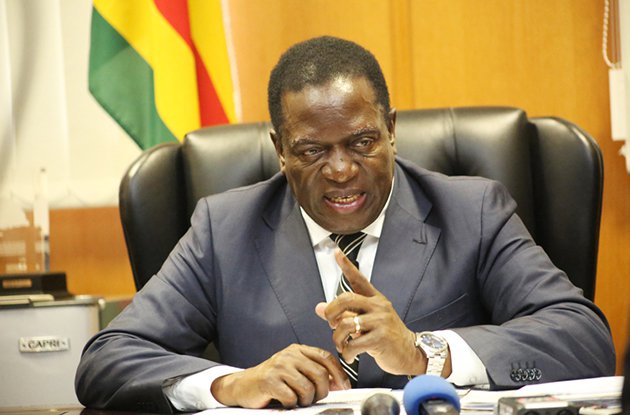By Tendai Kamhungira
It is just over a month since President Emmerson Mnangagwa took office.

In the 30-plus days, the 75-year-old politician — who took power from long-ruling former president Robert Mugabe in a dramatic way — has embarked on an aggressive move aimed at changing the country’s economic and political atmosphere ahead of the make-or-break 2018 polls.
Since his inauguration, he made several constructive and progressive promises and commitments that projected him totally differently from his predecessor — 93-year-old Mugabe.
Mnangagwa came into power after the “Operation Restore Legacy” exercise that was shepherded by the Zimbabwe National Army, led by now retired general Constantino Chiwenga, on November 24.
Already, he has reduced the number of Cabinet ministers — a move that will help cut government costs, considering the demands by these officials.
His predecessor, Mugabe, maintained a bloated Cabinet, which resulted in duplication of roles and a burden to the country’s strained fiscus.
After reducing the number of Cabinet ministers, Mnangagwa has also been trying to lessen costs through using a low cost airline Fly Africa, when he went to South Africa (SA) on his first official visit.
While in SA, Mnangagwa met exiled Zimbabwean business people, and urged them to help in rebuilding Zimbabwe’s broken economy.
The Diaspora is an important component in the country’s development and their investments can help boost the country’s economy.
From day one, Mnangagwa’s stance was to implement reforms that will ensure that Zimbabwe will become an investment destination.
He has since amended the Indigenisation Act, which compelled foreign-owned companies to cede 51 percent of shareholding to black locals.
The Act now only applies in the natural resources sector with specific reference to diamond and platinum.
Having been in government for a long time, he knows too well what went wrong over the years during Mugabe’s administration.
And many believe he is well informed and equipped to correct Mugabe’s wrongs in his first 100 days in office.
Within his first month in office, Mnangagwa has since issued a three-month moratorium to all looters of national and public resources, a long overdue move, if executed, that will restore confidence and trust, and improve accountability.
His administration has already signed a $213 million deal with China for the rehabilitation of the Robert Gabriel Mugabe International Airport, which is expected to improve the number of visitors into the country.
At the same time, African Export-Import Bank (Afreximbank) proposed to inject $1, 5 billion and a $600 million nostro stabilisation facility.
Mnangagwa has also taken a tough stance on corruption, promising to deal with the scourge decisively.
Corruption has become a serious problem in Zimbabwe, with many analysts claiming it is a major cause of the economic problems in the country.
Just a few days ago, Mnangagwa escalated his anti-corruption campaign, as he warned land barons who are illegally parcelling out land.
While many, including the opposition political parties like the Morgan Tsvangirai-led MDC, believe Mnangagwa has taken a positive trajectory towards making a promise to improve the country’s economy, they feel that he ought to walk the talk.
MDC spokesperson Obert Gutu said: “Whilst the MDC is pleased to note that the new administration has publicly pledged to combat corruption, it is very worrisome and disturbing to note that only members of a particular faction of the ruling party are being targeted for arrest and prosecution.
“It is a public secret that there are several high level crooks and criminals who are still occupying lofty positions in the Mnangagwa administration but these individuals remain scot-free.”
“Thus, there is a perception that the anti-corruption crusade is being executed on factional lines. The MDC is on record calling for the arrest and prosecution of all criminals regardless of their factional and political affiliation. It is only when the anti-corruption fight is impartial and holistic will the generality of the people of Zimbabwe start to believe that the new government’s much touted zero tolerance towards corruption is genuine and not just meant to settle political scores,” he said.
Since the coming in of Mnangagwa, the Zimbabwe Republic Police has reduced roadblocks, which many complained had become a menace to the tourism sector, as foreigners were now shunning the country, as they failed to move around freely without being harassed.
The move to remove incessant roadblocks has become a positive move that many also believe will help to improve the country’s economy.
He has also introduced a new work ethic in the civil service, where he said people must be served on time in government offices.
Some banks have already started issuing US dollar notes, which had become scarce during the Mugabe era, with bond notes having become the most dominant medium of exchange.
Though the exchange rate between the US dollar and the bond note has fallen, some prices of commodities remain high in most shops.
The Tendai Biti-led People’s Democratic Party (PDP) said there is need for the government to deal decisively with the multiple exchange rates situation in the country, adding that it is one of the drivers of inflation.
“More importantly the government must demonetise the bond note as a matter of urgency, the pseudo currency is the key source of distortions in the financial markets which are ultimately resulting in inflation,” PDP spokesperson Jacob Mafume said in a statement. Daily News






